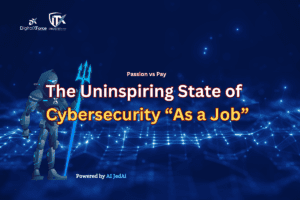
Lalit Ahluwalia is committed to redefining the future of cybersecurity by helping large, medium, and small-scale businesses build digital trust. Here, Lalit explores the sad state of cybersecurity ‘as a job’ and how it impacts the way professionals approach security in the digital landscape. From checking compliance boxes and passionless leaders infecting their teams, which leads to an uninspiring career. The outcomes are devastating for security organizations and the businesses they protect. He also points out the need for shifting to a passion-driven approach that sees cybersecurity as a mission and call to serve, not just a 9 – 5 job.

Cybersecurity today thrives on the traditional perspective that treats the profession merely as a job—a set of tasks to be executed, boxes to be checked, and threats to be mitigated. You click send on yet another phishing test email. As a Pentester, for instance, this is part of your routine – sending simulated attacks to catch gullible employees who still fall for them. Days and weeks pass but nothing changes.
As the months drag on, you feel your enthusiasm waning. The training completion rates barely budge. The phish click rates stay frustratingly high. You’re putting in the hours, but does it matter? The sense of disengagement is all too common among cybersecurity professionals today. With threat actors continually evolving and security breaches making global headlines, we desperately need inspired leadership driving meaningful change. See Cyber Watch – November 30, 2023
That’s the focus of this article: to reinstate cybersecurity as a passion-driven mission, not just another 9-5 job.
Is Cybersecurity a Game of Checking Boxes?
Treating cybersecurity as any other 9 to 5 job breeds complacency. Leaders fail to foster engaged, creative teams that can keep up with emerging risks. Initiatives like awareness training become empty compliance exercises rather than opportunities to catalyze cultural change.
As an industry predicted to reach $300 billion by 2026, this approach has given rise to leaders who lack inspiration, competence, and excitement, inadvertently influencing security teams to adopt a checkbox mentality, rather than a call to serve. The consequences of treating cybersecurity as just another job have been severe, impacting our commitment to data protection, digital trust, and privacy.
In 2022 alone, over 1,800 publicly disclosed breaches exposed over 32 billion records. See Harvard Business Review Many of these could have been prevented with stronger human defenses. However, the dominant workplace mindset treats security as a back-burner priority rather than an inspiring mission. Employees just try to quickly click through the required training to check the box. Their glazed-over eyes say it all – they’re hardly internalizing anything that could help them spot the next phish.
Cybersecurity-as-a-job: How Passionless Leaders Infect Teams
Disengaged leaders fail to inspire those under them. Their clinical, soulless attitude toward cybersecurity trickles down through the ranks. When the boss views awareness training as a formulaic mandate, employees will mirror that indifference. The organization suffers from a culture that enables rather than prevents breaches.
The costs of this cultural malaise are staggering. “According to the IBM Cost of a Data Breach Report 2023, the global average cost of a data breach in 2023 was $4.45 million, 15% more than in 2020”, reports Security Intelligence. However, the true impacts of eroded consumer trust and regulatory fines can haunt victimized brands for years. Still, most cybersecurity leaders remain stuck in reactive rather than proactive mindsets focused on sustainability.
Data privacy, a cornerstone of effective cybersecurity, is often neglected when the job mentality takes precedence. Cyber defenders must recognize that the erosion of data protection and digital privacy erodes trust, which is a critical component of any cybersecurity strategy.
The Need for Passion-Driven Security Leaders on a Mission
With threat landscapes growing exponentially, we need CISOs and cyber awareness teams driven by passion and meaning rather than simply occupying roles. The cybersecurity-as-a-job mentality has created a scenario where professionals approach their responsibilities mechanically, solely focusing on meeting basic requirements rather than truly understanding and combating the evolving nature of cyber threats.
The constant pressure of meeting compliance standards and ticking off boxes, especially for CISOs, can lead to burnout, reduced job satisfaction, and ultimately compromise the efficacy of cybersecurity efforts. All security professionals must pursue security not as “something my company makes me do” but as a call to serve, a way to build digital trust, enable innovation, and protect society’s digital foundations. See Inspection Reforms
Turning this vision into reality requires several mindset shifts:
- Make emotional connections through storytelling. Cyber awareness pros should highlight real-life social engineering scams that play on human emotions. The facts and figures don’t inspire change – the stories do.
- Foster intrinsic rather than extrinsic motivation. Extrinsic “sticks and carrots” like compliance scoring often backfire. Effective influencers awaken employees’ inner desire for growth and social contribution.
- Align cyber values with personal ones. Help employees see how security behaviors map onto their principles around privacy, wisdom, and ethical digital citizenship.
- Emphasize mastery over boxes checked. To drive engagement, true experts focus less on completing activities and more on advancing expertise. Though subtle, this reframing is powerful.
- Inspire culture change through passion. The most effective influencers shine with charisma and conviction that gets others saying “I need to raise my game.” Their fire is contagious.
Turning the Tide Through Inspired Leadership
The tide is slowly starting to turn. After high-profile hacks like the October 2023 ICMR Indian Council of Medical Research and 23andMe breaches, where 815,000,000 and 20,000,000 records were exposed, more leaders are facing harsh scrutiny over cyber failings. In 2016, CSO Joseph Sullivan was fined $50,000 for covering up a data breach.
November 2023 was quite dramatic with Morgan Stanley fined $6.5 million “for exposing personal information through negligent data-security practices” as Security Week reports. That’s not all. Just recently, the US government fined Binance’s CEO, Changpeng Zhao, a whopping $50 million for failure to prevent money laundering on the platform, thus posing a financial security threat to the American people.
Investors want to see true passion for security, not just checked boxes. There’s a great need to “move from security as a burden to security as an adventure – intriguing, mastery-oriented, purpose-driven.” This passion-fueled style of engagement stands in stark contrast to vanilla compliance reports. Rather than forcing employees to click through training, leaders should trigger their natural sense of intrigue about social engineering and equip them to spot red flags. Fascination is the antidote to fatigue.
Cybersecurity as a Passion-Driven Adventure
The message is clear: cybersecurity can no longer afford leaders just clocking in to do the bare minimum before clocking out. As security pioneer Bruce Schneier warns, tomorrow’s threats are advancing much faster than today’s defenses. See Transform Issue 01 This means prioritizing agile learners who connect with teams on a deeply human level.
Nor can the old model of top-down authority suffice anymore Cybersecurity needs key players who can drive change through handed leadership, inviting ideas from all levels – the kind that uplifts marginalized voices rather than silencing them to avoid rocking the boat. The future belongs to influencers who can cultivate cultures where every member contributes value from their unique passions and talents.
Cybersecurity urgently needs this infusion of energy. With passionate, inspiring visionaries leading the charge, we can transform the field from obligations into a shared adventure to build a better digital world. That collective sense of purpose and possibility can help turn the tide against increasingly sophisticated threats. But cultural change starts with each of us. What one action could you take today to advance your team’s security mission? Small steps by many create a massive impact. Our shared digital future – and security – depends on it.
It’s time to reevaluate our approach to cybersecurity, placing mission-driven passion at the forefront. Only through a collective commitment to this paradigm shift can we hope to build a cybersecurity landscape that is not just resilient but also inspired, innovative, and truly effective in the face of ever-evolving cyber threats.
 "Digital trust" cybersecurity solutions enabling automated, real-time risk mitigation are crucial for protecting organizations in today's threat landscape.
"Digital trust" cybersecurity solutions enabling automated, real-time risk mitigation are crucial for protecting organizations in today's threat landscape.